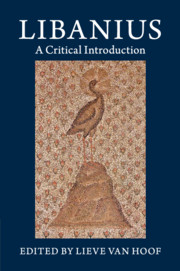Book contents
- Frontmatter
- Dedication
- Contents
- List of tables
- Notes on contributors
- Preface
- Abbreviations
- Introduction: Libanius at the margins
- Part I Reading Libanius
- Part II Libanius’ texts: rhetoric, self-presentation and reception
- Part III Contexts: identity, society, tradition
- Chapter 9 Emperors and empire in Libanius
- Chapter 10 Libanius’ networks
- Chapter 11 Libanius and the literary tradition
- Chapter 12 Libanius and the ‘game’ of Hellenism
- Chapter 13 Not the last pagan: Libanius between elite rhetoric and religion
- Epilogue Libanius at the centre
- Appendices: survey of Libanius’ works and of available translations
- References
- Index locorum
- General index
Chapter 13 - Not the last pagan: Libanius between elite rhetoric and religion
from Part III - Contexts: identity, society, tradition
Published online by Cambridge University Press: 05 October 2014
- Frontmatter
- Dedication
- Contents
- List of tables
- Notes on contributors
- Preface
- Abbreviations
- Introduction: Libanius at the margins
- Part I Reading Libanius
- Part II Libanius’ texts: rhetoric, self-presentation and reception
- Part III Contexts: identity, society, tradition
- Chapter 9 Emperors and empire in Libanius
- Chapter 10 Libanius’ networks
- Chapter 11 Libanius and the literary tradition
- Chapter 12 Libanius and the ‘game’ of Hellenism
- Chapter 13 Not the last pagan: Libanius between elite rhetoric and religion
- Epilogue Libanius at the centre
- Appendices: survey of Libanius’ works and of available translations
- References
- Index locorum
- General index
Summary
Introduction
The religious history of the fourth century used to be understood in terms of a conflict between paganism and Christianity, with the former resisting the irresistible progress of the latter. As one of the major representatives of Greek culture in the fourth century, Libanius has often been interpreted in this light. Indeed, several of his works seem to substantiate such a view. His thirtieth oration To the Emperor Theodosius for the Temples has helped to shape the modern perception of the destruction of temples as the paradigmatic act of the supersession of paganism by Christianity – a perception that, notwithstanding continued scholarly interest in temple destruction, has recently been called a historiographical myth. Libanius also consciously associated himself with the emperor Julian, writing a Monody (Oration 17, early 364), a Funeral Oration (Oration 18, the so-called Epitaphios, written after 11/10/368), and an appeal to Theodosius I to avenge the (in his view) murdered Julian (Oration 24, 379). With these orations, Libanius intervened in the debate that was raging about Julian’s legacy – a debate that was clearly marked by religious oppositions. All these speeches explicitly and implicitly argue for the superiority of pagan religion and engage in what has been called Gegenapologetik, that is, implicit attacks on Christian tenets. Libanius thus assumes a much more explicit anti-Christian position than his most famous contemporary colleague among fourth-century orators, Themistius, who, around the same time, seeks to depict paganism and Christianity as ultimately converging on the same truths. Most recently, Jan Stenger has argued that religion is integral to Libanius’ conception of Hellenic identity and that he was consciously anti-Christian.
- Type
- Chapter
- Information
- LibaniusA Critical Introduction, pp. 293 - 314Publisher: Cambridge University PressPrint publication year: 2014
- 3
- Cited by



